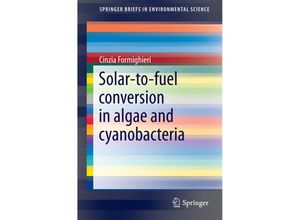This volume is focused on solar-to-fuel conversion using algae and cyanobacteria for advanced
generation biofuels. Production of biofuels needs to rely on cheap and renewable resources in
order to be economically viable and environmentally sustainable in the long term. Solar energy
is an abundant and renewable resource and strategies for solar-to-fuel conversion have the
potential to sustain our energy demands in the long term and to be carbon-dioxide neutral.
First generation biofuels are those already on the market such as bio-ethanol from sugarcane
and corn starch biodiesel from oil seed crops. However development of a single biofuel as
efficient as it may be would be insufficient and could not sustain the global demand for
energy. The next generation of advanced biofuels explores alternative feedstocks and
technologies finding novel solar-to-fuel solutions. Algae and cyanobacteria can convert
sunlight into chemical energy through the process of photosynthesis. They represent an
alternative with respect to crops for solar-to-fuel conversion that does not compete with food
for arable land. This SpringerBrief focuses only on solar-to-fuel conversion for production of
advanced biofuels pointing to the importance of relying on the sun for our sustainability in
the long term. It is the only current publication to discuss the problem of light-utilization
inefficiency during mass cultivation of micro-algae. This review also addresses the potential
of cyanobacteria for the generation of direct photosynthesis-to-fuel platforms and discusses
both possibilities and constraints for future developments.

